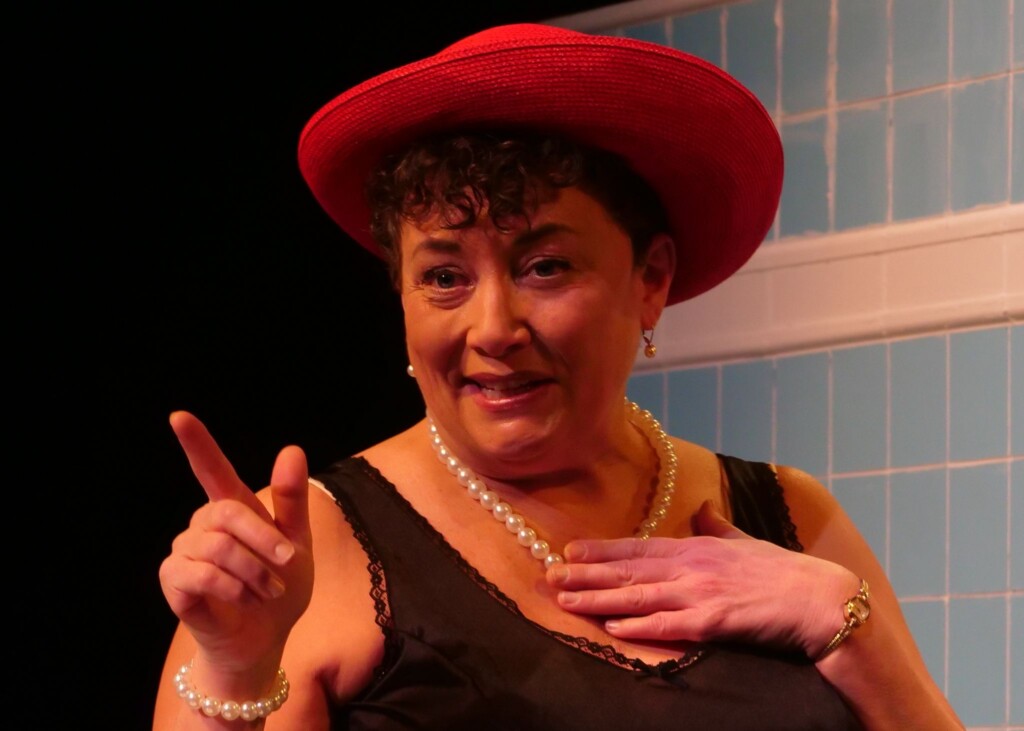SALT LAKE ACTING COMPANY: EGRESS
Aided by excellent acting in a small ensemble cast, the Salt Lake Acting Company’s Utah premiere of Egress, a play by Melissa Crespo and Sarah Saltwick nicely elucidates the metaphors about exits and safety that embody the narrative about the trauma and the steps toward recovering from a horrific breakup with a former boyfriend.
Reanne Acasio interprets the role of You with an astute poise and dignity, even as internally she becomes increasingly frantic and hesitant about acknowledging the inevitable reckoning she must face. In this case, You has moved to a small college in New Jersey, escaping from New York City after a harrowing breakup and the actions of her now former boyfriend. She has been hired to teach a course based on her expertise which is about the ethics of architectural planning and incorporating exit systems — that is, egress — into buildings. Her work has urgent and familiar relevance. For example: how can we assure the safe exit of individuals in the advent of a mass shooting or a terrorist attack. The passing references of gun violence serve to gird the cohesive premise that drives the script. Also, SLAC is highlighting its partnership with the Gun Violence Prevention Center of Utah (GVPC), as a community link relevant to the production.
The decision to give the characters generic names serves the internal logistics of the play as well. J.C. Ernst is Man, deftly handling the spectrum of various characters in the role. He switches effortlessly from the likable but not-all-that-bright student to a salesperson hawking guns and, of course, most ominously, to the violent former boyfriend. Vee Vargas is Woman, who has own her spectrum of character roles and achieves the contrasts with appropriate tone and rhythm. At one point, she is the low-key roommate and friend but then as prosecutor, she lays out straightforwardly the reasons why You should agree to testify against her former boyfriend. This is the source of You’s greatest fears, worried that her attempt to find justice and closure might end up in ever worse consequences for her.
The production is directed by Colette Robert, who also directed last year’s online reading of the play for SLAC audiences as part of the New Play Sounding Series Festival. The play received a full production premiere recently in Dallas at the Amphibian Stage. There also are the usual elements of a polished production, rounded out by team members including Dennis Hassan and assistant Sera Sheare (set design), Dominique Fawn-Hill (costume designer), Jessica Greenberg (lighting designer), Jennifer Jackson (sound designer), Erik Reichert (props design) and Jennie Sant as stage manager. Some of the best scenes are those of You’s nightmares and memories of her former boyfriend, enhanced by shadow effects and lighting. These punctuate the rhythm of the narrative, which at times could have been tighened yet further to amplify the sensation of a psychological thriller.

In-person performances for Egress continue in SLAC’s Upstairs Theatre (168 West 500 North) through Feb. 27. The production will stream on SLAC Digital from Feb. 21 through March 6. Kenny Riches has directed and edied the filmed version of Egress, courtesy of SLAC’s partnership with The David Ross Fetzer Foundation for Emerging Artists (aka The Davey Foundation).
For in-person performances, tickets are now on sale and 50th Season subscription packages are also available. Streaming tickets will be available closer to the streaming window; tickets are $20 per household for a 48-hour viewing period. For more information about tickets, the production, the remaining productions in SLAC’s golden anniversary season and the company’s COVID-19 policies regarding admission, see the SLAC website.
PYGMALION THEATRE COMPANY: BELLA BELLA
Three years ago early in her first term after becoming the youngest woman ever elected to Congress, U.S. Representative Alexandria Ocasio-Cortez paid tribute on Twitter to the “People’s History of Badly Behaved Women: NYC Congressional Queens Edition.” She cited three examples: Shirley Chisholm, Elizabeth Holtzman and Bella Abzug. She called Abzug, who once said that “women have been trained to speak softly and carry a lipstick,” the “Queen of the West Side.”
Pygmalion Theatre Company’s latest production of Bella Bella, a one-actor show written by Harvey Fierstein, invokes a convincing, astutely accurate portrayal of Abzug in her most colorful rough-and-tumble image. Tamara Johnson Howell pulls all of the right strands from Fierstein’s theatrical tribute, which is based on Abzug’s words as well as those by members of her inner circle of friends and colleagues. Directed by Fran Pruyn for its Utah premiere, the play received its world premiere in 2019 with Fierstein taking on the role himself.
The play is based on the Democratic primary election night in 1976 when Abzug narrowly lost her bid to become the party’s candidate for the U.S. Senate. She had won three consecutive terms to the U.S. House of Representatives and had given up the opportunity to win a fourth term, which would have been an easy cakewalk, in order to try for the senate seat which was held by Republican James Buckley, the son of William F. Buckley, the conservative movement’s most familiar public intellectual. It was a five-way primary race and Abzug came in second, slightly less than 10,000 votes shy of overtaking the eventual winner of the primary and general election, Daniel Moynihan.
After that, Abzug would never win another election. In the next 17 months, she would lose two more races. The first came in the Democratic mayoral primary for New York City, where she lost by a large margin to Ed Koch. In a 1978 special election, looking to return to the House of Representatives in a district that was Democratic by a 3-1 margin, she lost by just 1,270 votes to a Republican who had barely any name recognition and a bare-bones budget of just $150,000 when the five-week campaign started. In her final try eight years later, at the age of 66, she lost again.
What happened to the Abzug magic? Fierstein chooses the right moment to frame his tribute to her. In 1976, she was at the apex of her political profile — a dimension that Howell presents very credibly in her performance. Abzug certainly believed in her electoral invincibility, but it is evident late in the play, as a subtle moment of foreshadowing, that perhaps Abzug already was worried that her critics would delight in the idea of writing her political obituary.
One of the most prominent feminists in the 1970s, Abzug had collaborated with and clashed with her colleagues — Gloria Steinem, Shirley Chisholm and Betty Friedan, with whom she founded the National Women’s Political Caucus. The movement had plenty of stars and powerful personalities and one could see why Abzug, the epitome of the unapologetic and über-confident activist, envisioned herself as the exemplar of women’s political empowerment. In 2020, Mrs. America, the nine episodes of the television series highlights, albeit as a fictional account of historical realities, the clashes these dynamic leaders had over moving forward the Equal Rights Amendment and other issues of political importance to women are core narrative elements. One of the fiercest clashes is depicted in the third episode featuring Chisholm, the first Black woman elected to the House of Representatives, who announced that she would seek the Democratic nomination for the presidency, and the fight over including abortion rights in the party’s platform in 1972. In an Esquire magazine article, Nora Ephron recounted the debate at the convention, which included a screaming match between Abzug, who supported including the abortion rights plank to the platform, and actor Shirley MacLaine, who supported abortion rights but thought that a strong political statement also would hurt George McGovern’s bid for the presidency and the cause for abortion rights.
In the play, there are numerous mentions of the other feminists and Howell telegraphs these passing references with the confidence that she has done her history homework for capturing the right essence that is in the undercurrents of the script. The play leaves audiences with some interesting questions that connect to today’s political dynamics. What might have been possible if Abzug had embraced a more patient long-game strategy of staying in the House and moving steadily up the leadership. This also is a question that many have contemplated about Ocasio-Cortez, who is set to win her third term in Congress this fall. Some have suggested that Ocasio-Cortez should try for a Senate seat or other electoral pathways. There are many worthy lessons in the story of Abzug’s political life that could provide wise guidance and caution.
The show is truly delightful and kudos to Pygmalion for bringing this one-actor piece to Utah audiences. The run continues through Feb. 26, with performances on Thursday, Friday and Saturday at 7:30 p.m. and at 2 p.m. on Saturday.
Performances are in the Black Box Theatre at the Rose Wagner Center for Performing Arts in downtown Salt Lake City. For tickets and more information, including COVID-19 safety policies for admission, see the Pygmalion website,



